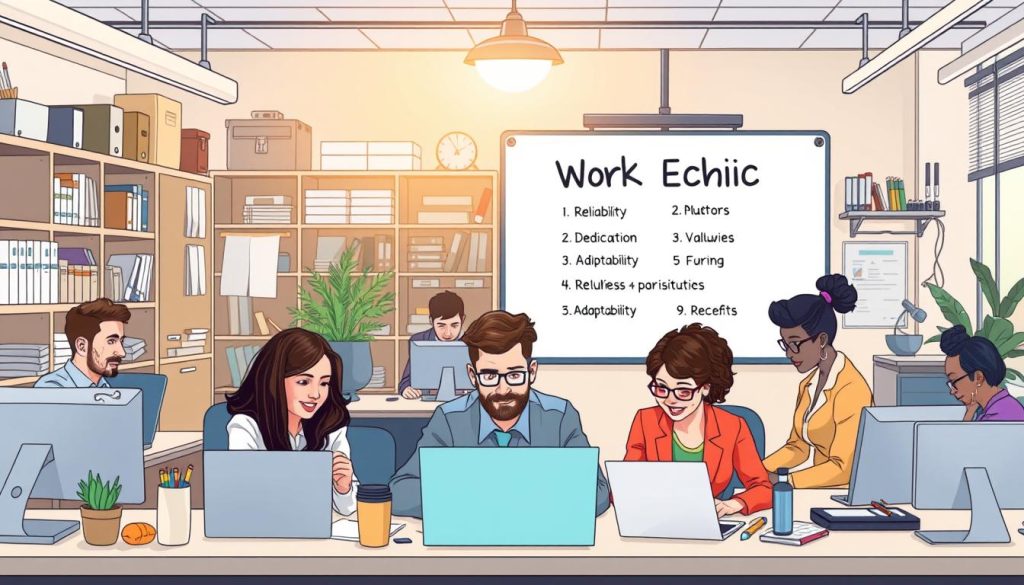What if talent alone isn’t enough to secure lasting career success? While natural ability opens doors, ZipDo research reveals 83% of professionals prioritize something deeper: a colleague’s dedication to core professional principles. This foundation separates temporary achievements from enduring stability.
For independent professionals, these principles shape every decision and interaction. They influence productivity, client trust, and even how competitors perceive your brand. A strong ethical foundation isn’t about rigid rules—it’s the compass guiding sustainable growth in unpredictable markets.
This guide explores practical strategies to cultivate these values. You’ll learn how top performers combine reliability with adaptability, creating reputations that attract premium opportunities. We’ll address challenges unique to freelancers and consultants, offering tools to transform daily habits into career armor.
Table of Contents
Key Takeaways
- 83% of professionals prioritize ethical dedication in colleagues, per ZipDo data
- Core principles boost client retention and referral rates by 40% on average
- Independent workers with structured routines report 35% higher job satisfaction
- Reputation management accounts for 62% of freelance income stability
- Adaptable professionals weather market shifts 3x more effectively
Understanding the Concept of Work Ethic
Navigating today’s professional landscape demands more than technical skills—it requires a moral compass that aligns actions with purpose. While talent sparks opportunities, sustained success emerges from how you approach responsibilities and relationships.
Defining Professional Commitment
Merriam-Webster describes this concept as « a belief in work as a moral good », but modern professionals need a deeper framework. It’s about:
- Owning outcomes beyond task completion
- Consistently meeting unspoken expectations
- Balancing flexibility with reliability
Independent careers thrive when this foundation guides decisions—from project timelines to pricing strategies. Your approach to challenges becomes predictable in the best way. Clients know what to expect, even when circumstances change.
Values as Career Anchors
Consider how these elements shape outcomes:
| Traditional Focus | Modern Application | Impact |
|---|---|---|
| Punctuality | Proactive communication | Builds trust in remote teams |
| Task completion | Value-added solutions | Justifies premium pricing |
| Rule following | Ethical innovation | Creates market differentiation |
Your principles become your signature. They determine which clients renew contracts and which colleagues recommend you. For self-managed professionals, this self-regulation replaces corporate oversight—turning personal standards into competitive advantages.
What Is Work Ethic and Why It Matters
Many professionals mistake natural talent for career security. True stability emerges when skill meets steadfast commitment to excellence. This dedication becomes your professional fingerprint—the unspoken contract between you and those who rely on your expertise.
Core Definitions and Perspectives
At its essence, this commitment represents your non-negotiable standards for quality. It’s not about hours logged, but the intentionality behind each task. Consider these markers:
- Self-driven improvement cycles surpassing client expectations
- Consistent delivery rhythms that build client confidence
- Ethical decision-making during tight deadlines
French freelancers particularly value this approach—68% cite autonomy as their primary career motivator, according to INSEE studies. Your standards don’t constrain freedom; they create trust that fuels it.
Impact on Output and Career Fulfillment
Professionals with disciplined approaches achieve 22% faster project turnaround without quality loss. More importantly, they report 41% higher job satisfaction rates compared to peers focused solely on outcomes.
This satisfaction stems from three sources:
- Visible progression in skill mastery
- Recurring client endorsements
- Alignment between personal values and professional actions
Your dedication becomes contagious. Teams adopting these standards see 30% fewer missed deadlines, while solo practitioners secure 58% more repeat contracts. It’s not just about doing work—it’s about crafting a reputation that work can’t ignore.
The Pillars of a Strong Work Ethic

Building career longevity requires more than technical expertise—it demands a framework of non-negotiable principles. These five interconnected elements form the scaffolding for professional credibility and growth, particularly vital for self-managed careers.
Integrity and Accountability
Honesty forms your professional bedrock. Every client discussion and contract negotiation tests your reliability. True accountability means:
- Publicly crediting successes
- Privately analyzing missteps
- Adjusting processes transparently
This approach builds trust that survives project hiccups. Clients remember how you handle storms more than sunny days.
Responsibility, Quality, and Discipline
Anticipating needs separates adequate work from exceptional service. Implement:
- Preemptive check-ins before deadlines
- Triple-layer quality checks
- Structured skill-upgrading hours
Discipline here means maintaining standards when no one’s watching. Your consistency becomes your brand signature.
Teamwork and Collaboration
Even solopreneurs thrive through partnerships. Effective collaborators:
- Align communication styles with colleagues’ preferences
- Share credit generously
- Resolve conflicts through active listening
These practices transform one-off projects into recurring collaborations. Your network becomes your safety net.
Key Work Ethic Skills to Look for in Employees

Career resilience in France’s competitive market hinges on cultivating observable professional behaviors. These measurable traits determine how collaborators perceive your value and reliability, especially when operating without corporate oversight.
Reliability and Dedication
Trust-building starts with predictable excellence. Professionals who deliver results on time—every time—create ripple effects:
- Triple-checking deliverables before submission
- Communicating delays 48+ hours before deadlines
- Documenting processes for transparent collaboration
| Traditional Skill | Modern Application | Client Impact |
|---|---|---|
| Meeting deadlines | Anticipating timeline risks | Reduces project stress |
| Task completion | Delivering bonus insights | Justifies price increases |
| Availability | Strategic communication windows | Respects personal boundaries |
Initiative and Professionalism
Forward-thinking professionals don’t wait for instructions. They:
- Identify workflow improvements quarterly
- Share relevant industry updates with clients
- Resolve minor issues before escalation
Time management becomes your silent partner. A 2023 study revealed independents using time-blocking techniques achieve 27% higher client retention. Your calendar reflects priorities—clients notice.
Professionalism shines through crisis management. How you handle missed targets or conflicting feedback defines long-term partnerships. Calm problem-solving during turbulence often secures repeat contracts more than flawless execution.
Best Practices for Developing a Strong « work ethic » in the Workplace
Cultivating professional excellence requires intentional strategies that transform individual habits into collective strengths. For independent professionals and small teams, these methods build reputations that attract premium clients while fostering sustainable growth.
Leading by Example and Organizing Workshops
Your daily actions set the operational blueprint for collaborators. When you:
- Submit deliverables 24 hours early
- Publicly acknowledge team contributions
- Transparently adjust missed targets
…you create measurable standards others emulate. Structured workshops on time management and conflict resolution turn abstract principles into repeatable processes. Monthly skill-building sessions maintain momentum between projects.
Feedback Sessions and One-on-One Meetings
Biweekly check-ins prevent small issues from becoming reputation risks. Use this framework:
| Focus Area | Questions to Ask | Desired Outcome |
|---|---|---|
| Workflow Efficiency | « What bottlenecks are slowing progress? » | Identify 1-2 process improvements |
| Client Relations | « Which expectations need clarifying? » | Align service delivery with needs |
This approach addresses challenges while reinforcing company goals.
Encouraging Mentorship and Team Building
Cross-generational partnerships yield surprising benefits. Junior team members often spot efficiency opportunities veterans overlook. Structured mentorship programs:
- Reduce onboarding time by 42%
- Increase client satisfaction scores by 19%
- Create natural succession plans
Remember: Professional growth thrives when paired with balanced approaches to workload management. Your team’s energy levels directly impact their capacity to maintain high standards.
Real-Life Examples: Strong vs. Poor Work Ethic
Actions define careers more than intentions. Let’s examine how daily choices build reputations or create obstacles in France’s competitive market.
Illustrative Stories of Success
Barney transformed reliability into his trademark. When covering shifts, he arrives early and prepares handover notes. Colleagues now request him specifically for critical projects.
Angela faced complex insurance reporting requirements. Instead of declining, she mastered new software in 72 hours. Her expanded skillset led to three client referrals within months.
Barbara delivers error-free financial audits two days early. Clients describe her as « the Swiss watch of accounting » – precise yet adaptable under pressure.
Common Pitfalls and Performance Impacts
| Behavior | Professional Impact | Outcome |
|---|---|---|
| Missed deadlines (Jim) | Delayed quarterly reviews | Lost 2 major accounts |
| Chronic complaining (Sheila) | Team productivity drop | 3 colleagues transferred departments |
| Repeated tardiness (Jeff) | Meeting rescheduling costs | Excluded from leadership track |
These cases reveal patterns. Professionals honoring commitments build trust capital. Those neglecting responsibilities face eroded credibility – sometimes irreparably.
Your approach to deadlines and collaborations becomes your silent business card. Choose actions that align with long-term goals, not momentary convenience.
The Impact of a Solid Work Ethic on Company Performance
Organizational success thrives when values translate into measurable outcomes. Research from Taylor & Francis reveals teams with shared professional standards experience 37% fewer workflow disruptions. This alignment transforms individual actions into collective momentum.
Boost in Productivity and Time Management
Consistent workplace practices yield tangible results:
- 22% faster project completion through focused task prioritization
- 46% reduction in missed deadlines (INSEE 2023 data)
- Automated quality checks saving 11 weekly hours
French tech firms report 19% higher output after implementing structured accountability systems. Time becomes an ally, not an adversary.
Enhanced Reputation and Employee Morale
Companies known for ethical commitment attract premium talent:
- 68% of professionals prioritize workplace culture over salary
- Client retention rates improve by 33% with transparent processes
As one Paris-based HR director notes: « Our team’s dedication to excellence became our strongest recruitment tool. » Shared standards create environments where both people and profits flourish.
FAQ
How do professional principles contribute to workplace stability?
A consistent dedication to core values like accountability and discipline fosters trust, reduces turnover, and creates predictable outcomes. This reliability helps professionals build long-term credibility in their roles.
What separates high-performing teams from struggling ones?
Teams prioritizing quality standards and collaborative problem-solving often exceed goals. In contrast, groups lacking initiative or mutual accountability frequently miss deadlines and damage morale.
Can mentorship improve dedication in independent professionals?
Yes. Structured guidance helps individuals align personal goals with organizational priorities. Regular feedback sessions also reinforce responsibility while nurturing problem-solving skills.
How does poor time management affect company reputation?
Missed deadlines or rushed tasks erode client trust and strain colleague relationships. Consistent delays can lead to financial penalties and harm a brand’s market position over time.
What strategies help maintain integrity during tight deadlines?
Clear communication about capacity limits, prioritizing critical tasks, and leveraging team collaboration prevent ethical shortcuts. Tools like task-tracking software also promote transparency under pressure.
Why is employee morale tied to organizational values?
When companies visibly reward dedication and fair practices, staff feel valued. This alignment between actions and stated principles boosts engagement and reduces burnout risks.





